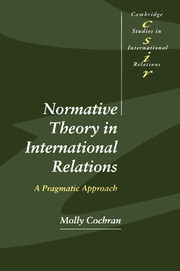Conclusion
Published online by Cambridge University Press: 22 September 2009
Summary
Wittingly or unwittingly, the construction of normative IR theory in terms of the cosmopolitan/communitarian debate has given primacy to epistemology, through its efforts to justify its ontological priorities and stake a claim that can rest solidly, providing an unshakeable international ethics in face of the diversity within international practice. In bolstering their ontologies with a contestable orientation to epistemologically centred argument, cosmopolitans and communitarians are creating obstacles that need not be in the way of normative theorizing in IR and as a result, are closing down the possibilities we may have for exploring the interplay between these positions. Also, until we recognize that there is no truth for these claims to be found ‘out there’, we will be needlessly diverting energies that are required for continual engagement with the ethical criteria that we propose, the interrogation of existing institutional arrangements, and the imagining of new institutional possibilities. Once a move is made to work as free of epistemologically centred argument as someone who wants to outline an ethical position is able, we are not left with the conclusion that normative standards are no longer available, only that we have to recognize their contingency and build upon what possibilities can then be created for the expansion of moral inclusion in international practice.
The first line of inquiry pursued in this book was to examine the nature and the extent of the impasse in normative IR theory, as it is presently discussed within the framework of the cosmopolitan/communitarian debate.
- Type
- Chapter
- Information
- Normative Theory in International RelationsA Pragmatic Approach, pp. 273 - 280Publisher: Cambridge University PressPrint publication year: 1999

